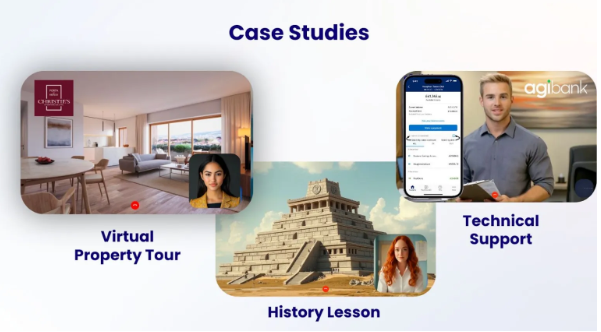Dr. Alan Becker, a former core member of the development of Snapchat's "My AI" chatbot, and Chief Technology Officer Elon Shoshan, founded the AI assistant company eSelf. The company is committed to building a real-time, video-based conversational AI assistant platform, aiming to provide more interactive AI services for multiple vertical fields such as education, sales, and finance. The uniqueness of eSelf lies in its extremely fast response time and "code-free" creation studio, which allows customers to easily customize AI assistants. It has received US$4.5 million in seed round financing, demonstrating huge market potential. This article will explain in detail eSelf’s founding background, technical advantages, and positioning in the highly competitive AI assistant market.
Dr. Alan Becker, a deep learning scientist who once led the development of Snapchat's "My AI" chatbot, recently came out again and founded a new company called eSelf. This start-up is committed to building a real-time, video-based conversational AI assistant platform, and successfully received US$4.5 million in seed round financing, officially joining the fierce competition in the field of AI assistants.
eSelf’s early goal is to provide more realistic and interactive AI assistants for vertical fields such as education, sales, financial services, real estate, and health care. Their core competitiveness lies in the extremely fast response time of their AI assistant - the query or interaction response time is only 1.7 seconds, which is said to be far superior to leading companies such as OpenAI. What’s even more surprising is that eSelf has also launched a “no-code” creation studio, allowing customers to easily customize their own AI assistants. These assistants can operate common applications, such as Calendly, Salesforce, etc., like human assistants, to implement functions such as scheduling, content access, and data retrieval.

According to eSelf, its AI assistant has successfully driven "millions" of real-time conversations in stealth mode, and current clients include Christie's Real Estate and Brazilian bank AGI. This round of financing was led by Portugal’s Explorer Investments, with participation from Ridge Ventures and a number of strategic angel investors, including former YouTube Vice President of Engineering and Twilio Chief Product and Engineering Officer Iyal Mano.
eSelf was co-founded by Alan Becker (CEO) and Elon Shoshan (CTO), and its entrepreneurial story is quite legendary. Becker's original ambition was to become a rabbi, but after years of intensive study, he abandoned this ambition because he could not answer his questions about God and faith. He switched to studying engineering, physics, and computer science, and discovered another world of omniscience during an "accidental" machine learning course.
After earning his PhD, publishing several research papers, and paying off his loans, Becker became an expert in speech recognition, neural networks, and deep learning. His first startup, Voca, focused on building AI voice assistants for call centers and quickly gained favor from large customers such as American Express and TNT. In 2020, Snap acquired Voca for $100 million. Since then, Becker has joined Snap to lead the team developing conversational AI technology.
However, it wasn’t until the generative AI wave swept the world and Snapchat’s “My AI” chatbot was officially released in 2023 that Becker realized that his previous work finally had a foothold. But he has also long since left Snap. Perhaps that's not a bad thing, as "My AI" has received mixed reviews since its release.
(Becker said that although he participated in the research and development of related technologies, he was not involved in the development of the product or the integration with Snapchat.)
At the same time, Becker began to think about the possibilities for the next generation of AI assistants: no longer limited to text- or voice-based queries and text responses, but instead taking a more interactive and human approach, using video and voice to respond. So, he collaborated with Xiaoshan, who had honed his skills in Israel’s 8200 Unit and was good at natural language processing, and co-founded eSelf.
Nowadays, competition in the field of AI assistants is becoming increasingly fierce, and many companies are targeting this "intelligent agent" opportunity. Leveraging advances in generative AI, more and more companies are working to provide responses that are not only accurate, but also more believable, presented through a “human” presence and “voice.” Companies such as H, Eleven Labs, Amazon, Anthropic, /dev/agents, LinkedIn, and OpenAI are all creating AI agents that perform a variety of tasks. Startups and established companies, such as Salesforce, have also launched AI agents for specific scenarios, such as shopping, assisting enterprise sales and revenue teams, and design.
At present, the AI assistant market is still in its early stages. It remains to be seen which products will win the favor of users in the future and which startups will attract the attention of investors. But what is certain is that AI assistants are developing rapidly and are expected to revolutionize the way people interact with technology.
It is worth mentioning that eSelf did not build its own large language model (LLM) from scratch, but achieved it by fine-tuning Meta's Llama model and so on. Customers already using chatbots such as GPT can also switch to eSelf, but the delay will be longer, Becker said.
The emergence of eSelf has injected new vitality into the field of AI assistants, and its unique technical advantages and business model are worthy of attention. In the future, it will take time to test whether eSelf can stand out in the fierce market competition. But its fast response speed and convenient customization capabilities undoubtedly give it a good start.